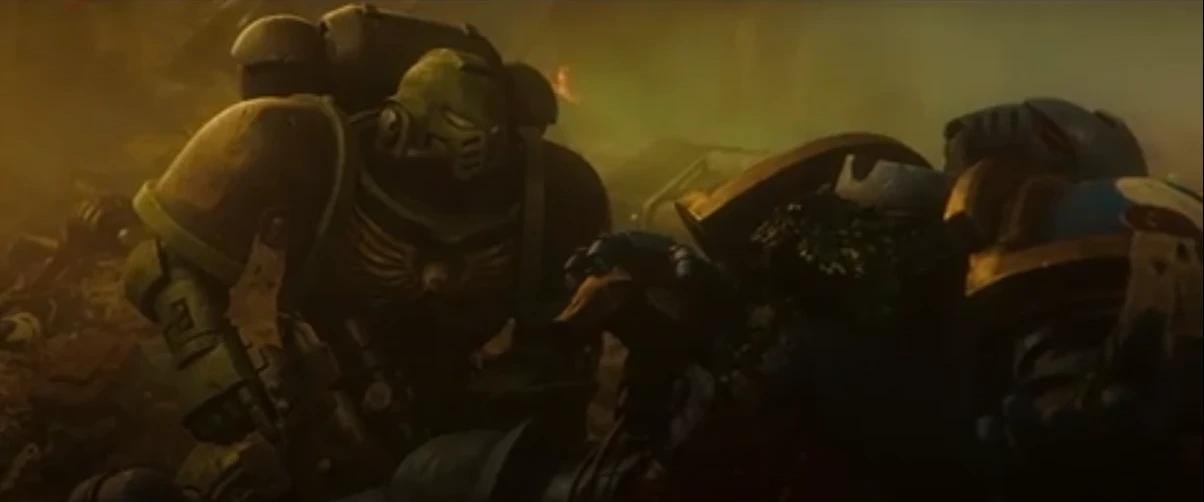A new series called Pariah Nexus is out on the Warhammer TV streaming service. I enjoyed the first episode, but the second episode is easily one of the best episodes of any series on Warhammer TV. This review is free of major spoilers, but if you want the show to be a total surprise then stop reading now and go read about something else instead.

Power fantasy
Superheroes are hard to do. It probably doesn't seem like it today, given the success of Marvel movies. But before Marvel changed the landscape of TV and movie superhero fiction, it was rare to see a really good superhero story. And outside of Marvel, it still is.
There are two typical problems. One leads to the other, and then back around. It's an endless cycle. A superhero that starts out super powerful and basically undefeatable is boring to watch. So we tell stories about superheroes we watch develop super powers throughout the story. When the superhero reaches full power, the story has to end, because that's the fulfillment of the story's promise. But then we don't get to sit and watch the superhero be a superhero. So we go back to the superhero being super powerful and undefeatable. But that's boring, so we're back at the beginning.
It's a notorious problem, and it's ruined many a childhood fantasy. All I ever wanted as a kid was to see Luke Skywalker be the ultimate jedi. I got a glimpse of it in Jabba's palace, but after that the story demanded that he literally throw his lightsaber away in a refusal to be the jedi that I wanted him to be. Decades later, some apocryphal movies get released that claim to be sequels, and rob me again of the power fantasy by writing Luke as if he were Uncle Owen.
I've yet to see a Batman movie I enjoy (although the Animated Series had it all figured out.) The modern Superman is baffling, and the Wonder Woman movies were profoundly disappointing.
It's hard to do.
Space marines aren't superheroes but in some stories they fill that role. And when they're written as the protagonists, they do it well. They're big, strong, powerful, nearly invincible, at least from the perspective of a human. And maybe more than most superheroes, the Astartes are written within the uncanny valley of post-humanity. Humans recognise that the Astartes exist to protect and defend, and they look human, but they're so obviously, almost frighteningly, different. That's exactly where the Astartes ought to be. Like Judge Dredd or RoboCop, the space marines are both sanctuary and threat, depending on what side of their law you are on, and the really terrifying thing is that you often don't know which side of their law you fall.
At the end of the previous episode (if you're reading this, I assume you've seen the first episode or else just don't care about spoilers), a lone space marine emerged from the ruins of the city and rescued Sister Danica. It was exciting and inspiring, and you could genuinely feel the same awe that the humans must have felt in that moment.
This episode is mostly about that lone space marine, Sarkan (spelling??) of the Salamanders. Of all the space marine chapters, the Salamanders are arguably one of the "good" or at least "gooder" ones, on the whole. They are ardently loyal and protective of humanity. They're not the kind of space marine who views mortals as cannon fodder or annoyances. They're the angels of the Emperor you've prayed for.
There's a scene about half-way through the episode where Sarkan uncovers a tiny group of survivors in a burned out church. The meeting is tenuous, desperate, and uncertain. The Salamander doesn't seem entirely comfortable with them (and why should he be? not only are they mortal, but he's also encountered several Necron-zombies already), and of course they've certainly never actually met an Astartes before. It's exactly the kind of power imbalance you want from such a scene, and it's captivating to watch each side convince the other to collaborate.
Later, the tables turn in an unexpected direction. Sister Danica points her weapon at the survivors, believing that they lack faith, that they're "unworthy", that they'll rot and turn into Necron zombies. The Salamander steps in front of her weapon, and for a few agonizing moments, two of the three protagonists in this story are enemies. It's unsettling and disappointing and upsetting, and it's exactly the kind of emotional manipulation Warhammer's confused and downside-up setting can manage like few other settings can.
Warhammer 40k
This episode is heroic and yet oddly realistic. It's about a superhero but it's also humanist. It's a superhero story without a superhero and, in a way, without a villain. Instead, the world is the villain. Duty is the villain. Faith is the villain.
This was a good episode, and it's surprisingly self-contained. You could watch this episode without watching anything that came before it or anything that comes after and feel like a complete, thoughtful, satisfying story has been told.
All images in this post copyright Games Workshop.